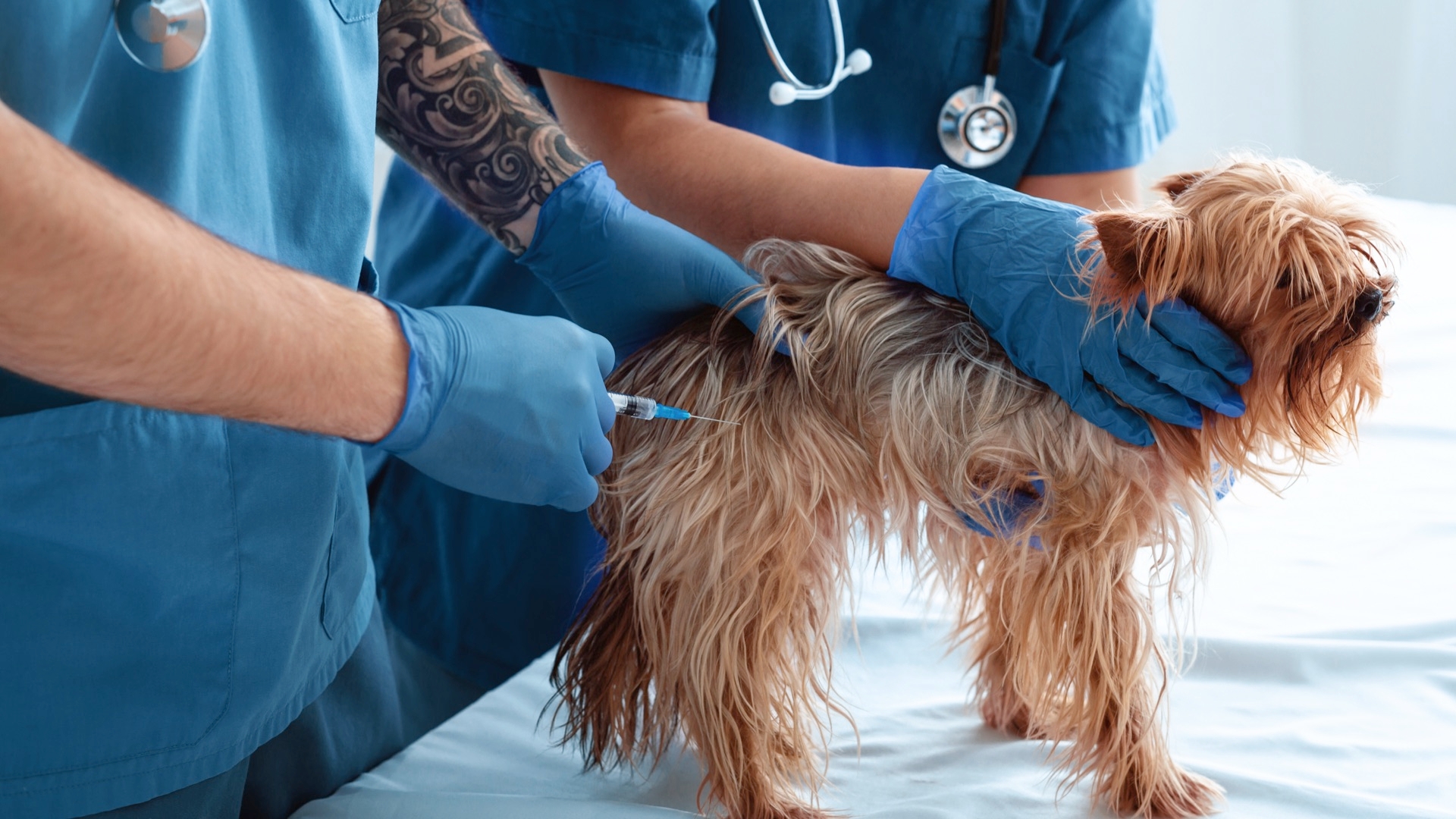Pet Vaccinations:
Summary:
Whether or not to vaccinate pets and how often to vaccinate are among the most debated questions in veterinary medicine in recent years. It used to be so easy: You took your dog or cat to your veterinarian once a year, your pet received the recommended vaccinations and whatever other things he or she might need, and you went on your way. Now, the standard of care in veterinary medicine has changed. No longer are we vaccinating every animal every year with every vaccine available.


Whether or not to vaccinate pets and how often to vaccinate are among the most debated questions in veterinary medicine in recent years. It used to be so easy: You took your dog or cat to your veterinarian once a year, your pet received the recommended vaccinations and whatever other things he or she might need, and you went on your way. Now, the standard of care in veterinary medicine has changed. No longer are we vaccinating every animal every year with every vaccine available.
Vaccines have been divided by the veterinary community into “core” and “non-core” vaccinations. Core vaccines are those that every animal should get at some point during their lifetimes (e.g., rabies, distemper, parvovirus). Non-core vaccines are those that should be given based on the risk factors of a particular animal, such as feline leukemia virus (FeLV) vaccine for cats who are allowed outside, or bordetella (kennel cough) vaccine for dogs who are regularly boarded in a kennel.
The debate about pet vaccines
Some veterinarians have argued that vaccines can lead to immune-mediated conditions, cancers and organ-related illnesses. The most studied and well-documented example of this is vaccine-induced fibrosarcoma (a type of cancer) in cats due to the FeLV vaccine. The result has been changes in vaccine recommendations for cats, including how often and where to give the vaccines. Other concerns are not as well documented, but significant correlations have been made between vaccines and other illnesses.
The flip side of the argument is that vaccines have greatly decreased the amount of infectious diseases in animals. Before vaccines became routine, veterinarians spent a lot of time working with horrific infectious diseases, such as distemper, rabies, panleukopenia and parvovirus. We certainly still see those diseases, but much less frequently. Overall, vaccines have greatly improved the health of our pet population.
So, vaccines are very important for the overall health of our pets, but they need to be used judiciously. There is also a difference in the need to vaccinate pets living in homes and the need to vaccinate those who are in shelters or sanctuaries. For animals who do not yet have homes and are living in group or high-density situations (many of which can be quite stressful as well), vaccines are crucial to maintaining their health and the health of any new arrivals. There are very good reasons to vaccinate and administer appropriate booster vaccines to this population of animals.
Vaccines, the law and your pets' lifestyle
The most straightforward reason to vaccinate your pets is to comply with local law. For instance, in general, every community requires that dogs (and in some communities, cats) be vaccinated for rabies. This is a public health issue because rabies is zoonotic (which means it's a disease that can spread from animals to people) and it is not a curable disease. The only time it is acceptable not to vaccinate for rabies is if your pet has a disease that could be worsened by administration of the vaccine. Talk to your veterinarian about whether your pet has a condition that makes rabies vaccination inappropriate or damaging to your pet's condition. Unfortunately, your un-vaccinated pet will not be exempt from rabies quarantine laws if he or she bites someone.
Do your pets go to day care, dog parks or kennels? If so, they will be exposed to more diseases, so it is important to maintain a regular vaccination schedule. Some of these businesses may require verification that your pet is protected. They certainly care about your pet, but they also require vaccines because they don't want other animals to contract diseases at their place of business.
Another important variable is your pets' lifestyle. Does your dog encounter wildlife or play in areas where wildlife is frequently spotted? If the answer is yes, vaccinating for leptospirosis may be important. Does your cat spend time outdoors? Cats who roam around outdoors can come across diseases such as feline leukemia, and therefore should be protected against them. On the other hand, if your cat never goes outside, the rabies vaccine may be all that is needed. (Rabies vaccination is important for both legal reasons and because bats, which can get into most building structures, are a common carrier of rabies.) Discuss with your veterinarian the particulars of your pets' lifestyle, and he/she will tailor a vaccine schedule appropriate for your pets.
Frequency of pet vaccinations
Most animals living in homes do not need vaccines every year. (There are exceptions to this, of course, but they are not that common.) We recommend doing the puppy and kitten series, and a booster vaccine in one year, and then every three years for the majority of core vaccines — or possibly only rabies for indoor-only animals. Studies have shown that most animals have immunity from the diseases they are vaccinated against for at least three years after their first booster. This immunity may last even longer, but at this time, the recommendation is to administer most vaccines every three years. (Some vaccinations, however, like leptospirosis, need to be administered annually.) And when pets become elderly, most vaccines (except rabies) can be stopped, unless there are factors that make vaccinating necessary.
Some veterinarians and people who are concerned about over-vaccinating will run titers to the diseases for which we vaccinate. A titer measures the level of antibodies (protective proteins) that are present in the body to fight against specific diseases. Having a lot of these antibodies does not mean pets are 100 percent protected, but they typically are not going to become ill if exposed to the disease. Titers can be expensive and it can take several days to get the results. If you have concerns about over-vaccination, you should discuss the option of running a titer with your veterinarian.
In summary, vaccines are an important consideration for our pets' general health care and should be a cornerstone of appropriate wellness care for your pets. Whether a particular vaccine is right for your individual pet is a discussion you should have with your veterinarian.


